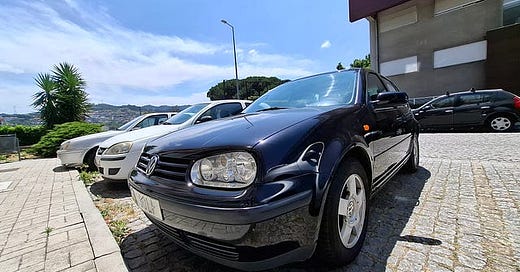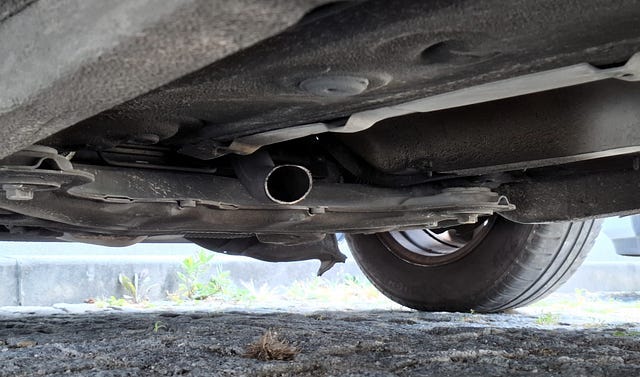A Day of Summer Bliss Ruined by Car Part Theft and Way Too Many Bills
It was the perfect beach day, right up until I turned the ignition key on my 27-year-old Volkswagen Golf Mk4 to head back home
For me, June has always been the toughest month of the year for car-related issues. But this year has been hard for me, with incidents and bills just piling up.
The Golf Mk4 launched in October 1997 for the 1998 model year, with the first models arriving in Portugal by May of that year. My car was among the first of its model on Portuguese roads, and I’ve been driving it ever since I got my license around my 19th birthday.
Here in Portugal, the vehicle registration month was until now a reference for all sorts of expenses. It’s when we pay your insurance, get the vehicle through its annual inspection, and we are also required to pay an annual vehicle fee called the Single Circulation Tax (IUC).
So earlier this month, I paid 62 euros in tax for my nearly 30-year-old Volkswagen.
On top of that, I also needed to get my VW Golf inspected at an official center by June 25th, as this is my car’s original registration date.
So before heading to the inspection center, I usually do a routine checkup. This year, I replaced the front tires, got a wheel alignment, and then changed filters and the motor oil.
All of that brought the bill up to a few hundred euros.
I thought I had it all covered as my car was running smoothly, so last Tuesday I finally took it to get inspected.
My car had never failed an inspection, and I was sure it would pass with flying colors.
So when the inspector pulled me aside, I was surprised to hear there was an issue with the right rear damper.
I wasn’t exactly thrilled when he handed me a red form instead of the usual green one.
I drove straight to the first auto shop I could find, had both rear dampers replaced, and headed back to the inspection center.
This time, it passed, but I had to add a couple hundred more euros to an already budget-bursting bill.
With all these car-related issues out of the way, and the first day of summer just around the corner, it was time for a long-postponed trip to the coast.
Our first day at the beach
I had promised my fiancée I’d take her to the beach this weekend.
The car was running fine. So after a hectic week, a quick getaway to the seaside on the summer solstice sounded like the perfect little romantic escape.
I picked her up around noon, and we headed for the ocean. The plan was to spend the afternoon at Mindelo Beach in Vila do Conde.
Mindelo is a small coastal village in northern Portugal. Probably the last place you’d expect to be a hunting ground for catalytic converter thieves.
But as I was about to find out the hard way, that wasn’t the case. These quiet coastal areas near Porto have become hotspots for this kind of theft in Portugal.
I parked my car in a residential area near the beach. I’m usually quite picky about the place I park, and this relatively busy street seemed fine.
You wouldn’t expect to get robbed in broad daylight in a small town in one of the safest countries in the world.
So, we picked up our things and headed to the beach, which was only a few minutes away.
When we arrived, we couldn’t have asked for a better scenario.
For those who have walked the Caminho de Santiago, you’ll know what I mean, as the route runs near the coast, crossing beautiful beaches like Vila Chã, Mindelo, Árvore, Vila do Conde, and Póvoa do Varzim.
So we stayed at the beach for a few hours, soaking up the sun as the tide slowly pulled back, revealing more of the rocks with each passing wave.
Everything was perfect, until it wasn’t
With sunset approaching, the wind started to pick up. This area is known for its chilly northern winds in the late afternoon.
We call it the nortada.
So it was time to say goodbye to the sand and sea.
Walking back to the car, we were happily chatting and talking about grabbing a quick meal on the way home.
We got into the car, and everything seemed fine. Until I turned the ignition key, and suddenly a thunderous noise roared to life.
Something was seriously wrong.
I stepped out and crouched down to check underneath. Sure enough, the catalytic converter was gone.
All that was left was a hole where a power saw had sliced clean through the metal.
My car had been scavenged for one of the most coveted auto parts.
Thieves target specific models, and cars produced between 1998 and 2001 are among the most vulnerable due to the high concentration of rare metal alloys.
Rhodium, platinum, and palladium have all surged in value since the pandemic, and prices spiked even further after Russia invaded Ukraine.
An article published last Friday (June 20) explains how the “platinum market is currently facing a significant supply deficit, making it a standout performer in the precious metals sector, breaking above the $1,300 per ounce mark for the first time in five years. This rally represents a year-to-date gain of more than 44%.”
I had just become another victim of this dark ripple effect in the parallel economy, “driven by a combination of tightening supply, shifting consumer demand, and growing investor interest.”
There wasn’t much I could have done to prevent it. And once it happened, there was only one thing left to do.
Call the police.
I needed to report the theft and file a complaint. As explained by the authorities (GNR), it’s something everyone should do when something like this happens.
Informing the authorities might help prevent it from happening to someone else.
As usual, it took them a while to show up, and there was little they could do.
They checked for CCTV cams in the vicinity.
There was none.
So, they took note of the incident and explained that there hadn’t been recent reports of catalytic converter theft in the area.
From what they told me, apparently, my car, the Golf IV, isn’t even one of the models thieves usually look for.
It’s the VW Polo converter that contains those rare metals.
“They may have confused your car with a Polo,” the officer told me.
“Just my luck,” I thought to myself.
And just like that, for the second time in less than a year, another of our trips ended the same way: our car loaded onto the back of a tow truck, and the two of us riding along in the tow truck’s cab.
The day after
All I needed was yet another unexpected bill. In a single month, I’ll have spent more than the car’s entire value.
I still need to get a hold of my mechanic and ask for a repair estimate, but I already know it’s going to have a lot of zeros.
What’s more, I have the insurance due next week. Even though it just covers third-party damage, it’s going to push my total expenses well past the one thousand euro mark.
So, I’m sharing my story to raise awareness about this issue and to highlight some important safety precautions.
If possible, always park the car in a garage, private property, or on CCTV-surveilled parking spaces.
If you have to leave it in the street, avoid parking in deserted or isolated, poorly-lit places.
Don’t park your car half on the sidewalk and half on the road; this makes the job easier for thieves.
You can also mark the converter with your vehicle’s license plate or VIN (Vehicle Identification Number), a 17-digit code similar to a personal ID number.
There are also catalytic-converter anti-theft devices you can use. These so-called “cages” may not stop the thieves from getting their way, but they do help make the job harder and louder.
I did take some of these precautions, but it wasn’t enough. If I could, I would change my car and buy an electric one, as converters are only found in petrol and hybrid vehicles.
I guess the only way to completely prevent converter theft is to drive a fully electric vehicle, as these do not have an internal combustion engine or an exhaust system.
Unfortunately, I can’t afford one right now, and even if I could, living in an flat makes home charging impossible, which is still the only affordable option for EVs here in Portugal.
So for now, I will try to pay my dues, get my nearly classic car back in shape, and pray that I don’t get targeted again anytime soon.
Thank you for reading. A little support goes a long way! If you’d like to help me keep creating, you can do so at my Ko-fi page or consider becoming a paid subscriber here on Substack.
Rui Alves is a language teacher, published author, international book judge, and publisher. He runs Alchemy Publications and serves as editor-in-chief for Engage on Substack, Life Unscripted, Musicverse, Writelicious, The Academic, Portugal Calling, Engage on Medium, Rock n’ Heavy, Beloved, Zenite, Poetaph, Grind, and Babel.










I’m so sorry your day at the beach ended with this theft of your catalytic converter. Sometimes life hands out some unwanted surprises. It’s hard to enjoy a beautiful day when you end up riding home in a tow truck.
Thanks for sharing tips about how to make it harder for thieves who want catalytic converters.🌹
That's awful, Rui, and no way to end your day at the beach. 🫤 When I lived in Texas we had a huge problem with catalytic converter thieves going through neighborhoods in the middle of the night. Some people were hit more than once, but I never heard of anyone being bold enough to try it during the day.